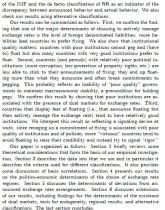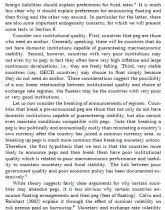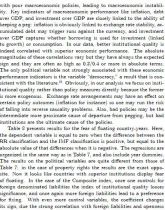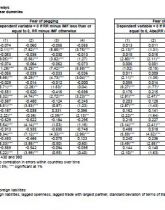Hľadaj
Zobraz:
Univerzity
Kategórie
Rozšírené vyhľadávanie
45 146
projektov
Choosing (and reneging on)
| Prípona |
Typ prezentácia |
Stiahnuté 0 x |
| Veľkosť 0,7 MB |
Jazyk anglický |
ID projektu 4350 |
| Posledná úprava 20.08.2017 |
Zobrazené 2 419 x |
Autor: - |
 Zdieľaj na Facebooku
Zdieľaj na Facebooku |
||
| Detaily projektu | ||
- cena:
20 Kreditov - kvalita:
96,3% -
Stiahni
- Pridaj na porovnanie
- Univerzita:Ekonomická univerzita v Bratislave
- Fakulta:Fakulta medzinárodných vzťahov
- Kategória:Ekonomika » Svetová ekonomika
- Predmet:Medzinárodné financie
- Študijný program:-
- Ročník:3. ročník
- Formát:PDF dokument (.pdf)
- Rozsah A4:36 strán
The difficulty of maintaining pegs is a well-known phenomenon. Recently, a different type of deviation from announcements has been quite common: Calvo and Reinhart (2002) show that while many countries claim to be floating, in fact they peg, experiencing what has been labeled “fear of floating.” Our goal is to identify what features of countries make them “fearful” of following through with actions what they announce in words, thus reneging on announcements of exchange rate regimes. Deviations from preannounced regimes are likely to imply increased uncertainty in currency markets, risk premia charged on liabilities issued in domestic currencies, and difficulties in conducting domestic monetary policy. We show below that different forces lead countries to announce a peg and then float and vice versa. Countries with inadequate institutions, associated with poor macroeconomic management, are incapable of holding pegs; countries with superior institutions tend to display “fear of floating,” perhaps in an attempt to signal their type. We begin by briefly reviewing the question of the choice of exchange rate regimes, that is, why certain countries choose to float or to peg. We build upon a recent literature, which includes Calvo and Reinhart (2000), Frieden et al. (2000), Hausmann, Panizza and Stein (2000), Levy-Yeyati, Sturzenegger and Reggio (2003), and Obstfeld and Taylor (2002), amongst others.1 Explaining the choice of exchange rate regimes is difficult from the start, since a classification of regimes is problematic. The IMF has traditionally produced a classification which is “de iure,” that is, it is essentially based on what the countries say that they do. For example in certain periods several countries are classified as floating even though their exchange rate never moves vis-a-vis, say, the US dollar. Various attempts have been made to adjust this classification or to offer altogether new ones. Some studies — like Ghosh et al. (1997), and Frieden et al. (2000) — adjust the IMF classification. The IMF itself has recently changed its classification (IMF 1999). Levy-Yeyati and Sturzenegger (2003) provide a classification based on data on exchange rates and international reserves. Shambaugh (2003) offers another classification based on statistical analysis of the exchange rate itself. Reinhart and Rogoff (2003) (RR) take a more radical approach: they classify regimes based upon a statistical analysis of the observed behavior of exchange rates, and consider explicitly the fact that many countries - even in the developed world - have or had dual exchange rate markets. In our analysis, we use the difference between the de iure classification.
Kľúčové slová:
výmenný kurz
režimy
klasifikácia
de jure
de facto
dual markets
the data
Obsah:
- Abstract
1 Introduction
2 Ourhypotheses
3 The data
3.1 Exchange rate regimes classifications
3.2 Institutional data
3.3 Economic variables
3.4 Some basic correlations
4 The choice of exchange rate regimes
5 Fearof floating and “fear of pegging
6 Additional results and sensitivity analysis
6.1 Dual markets
6.2 Endogeneity
6.3 Regional breakdowns
6.4 Probability of default
6.5 Alternative Classifications
7 Conclusions
References
Zdroje:
- Aghion P., P. Bacchetta, and A. Banarjee (2004) “A Corporate Balance Sheet Approach to Currency Crises” Journal of Economic Theory, 119, 6-30.
- Alesina A. and R. Barro (2002) “Currency Unions” The Quarterly Journal of Economics, 117, 409-36.
- Alesina A., R. Barro, and S. Tenreyro (2002) “Optimal Currency Areas” NBER Macroeconomics Annual 2002.
- Backus D. and J. Driffill (1985a) “Inflation and Reputation” American Economic Review, 75, 530-38.
- Backus D. and J. Driffill (1985b) “Rational Expectations and Policy Credibility Following a Change of Regime” Review of Economic Studies, 52, 211-21.
- Barro R. (1996) “Democracy and Growth” Journal of Economic Growth, 1, 1-27.
- Barro R. and D. Gordon (1983) “Rules, Discretion and Reputation in a Model of Monetary Policy” Journal of Monetary Economics, 12, 101-121.
- Bartolini L. and A. Drazen (1997) “Capital Account Liberalization as a Signal” American Economic Review, 87, 138-54.
- Bernanke B. and M Gertler (1989) “Agency Costs, Net Worth and Business Fluctuations” American Economic Review, 79, 402-23.
- Bertola G. and A. Drazen (1993) “Trigger Points and Budget Cuts: Explaining the Effects of Fiscal Austerity” American Economic Review, 83, 11-26.
- Bubula A. and I. Ötker-Robe (2002) “The Evoluation of Exchange Rate Regimes Since 1990: Evidence from De Facto Policies” IMF Working Paper Calvo G. (1999) “On Dollarization”, available at http://www.bsos.umd.edu/econ/ciecalvo.htm, under Policy Notes.
- Calvo G. and P. Guidotti (1993) “On the flexibility of monetary policy: the case of the optimal inflation tax” Review of Economic Studies, 60, 667-87.
- Calvo G. and C. Reinhart (2000) “Fixing for your Life” Brookings Trade Forum, Policy Challenges for the new Millennium.
- Calvo G. and C. Reinhart (2002) “Fear of Floating” The Quarterly 21 Journal of Economics, 117, 379-408.
- Cespedes F., R. Chang, and A Velasco (2002) “Balance Sheets and exchange rate policies” American Economic Review, 94, 1183-93.
- Drazen, A. (2000) Political economy in macroeconomics Princeton University Press.
- Drazen A. and P. Masson (1994) “Credibility of Policies versus Credibilty of Policymakers” Quarterly Journal of Economics, 109, 735-54.
- Edwards, S. and E. Levy-Yeyati (2003) “Flexible Exchange Rates as Shock Absorbers”, NBERWorking Paper.
- Eichengreen B., R. Hausmann and U. Panizza (2002) Original Sin: The Pain, the Mystery, and the Road to Redemption, prepared for the conference “Currency and Maturity Matchmaking: Redeeming
- Debt from Original Sin”, Inter-American Development Bank,Washington D.C.








